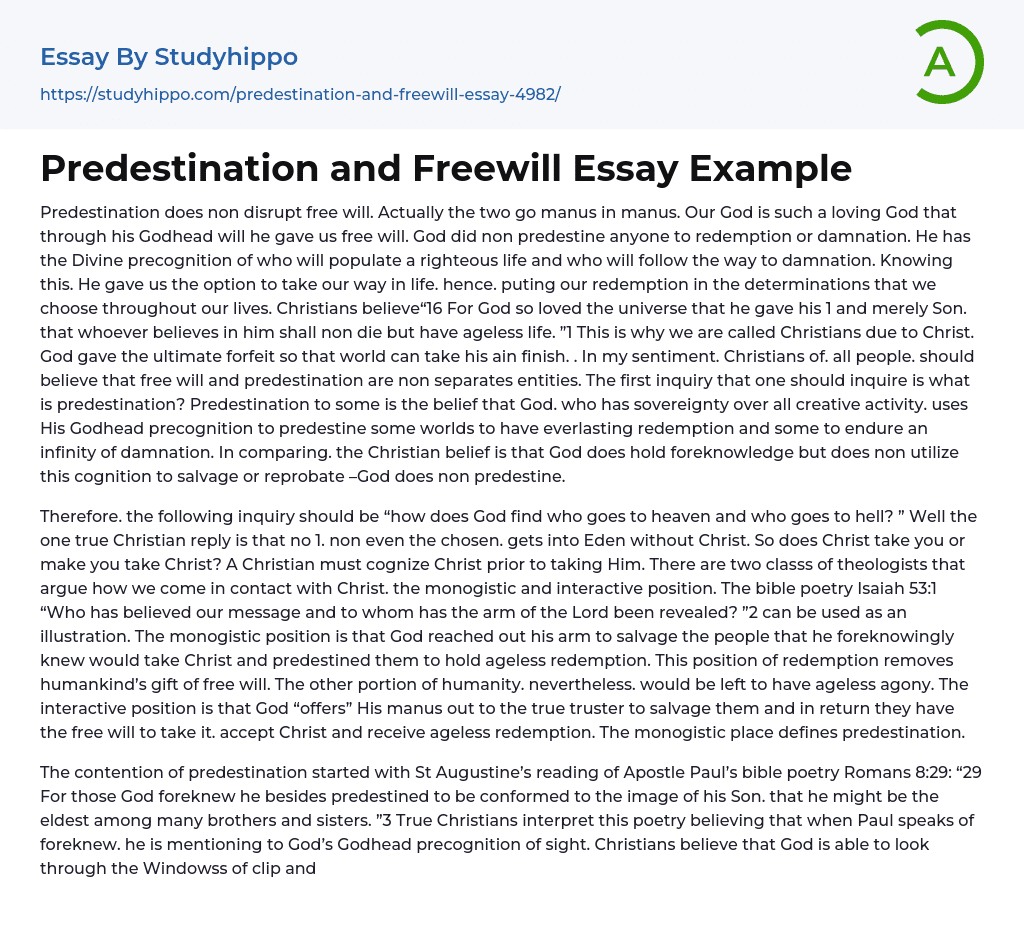The concept of predestination and free will, often considered contradictory, actually complement each other harmoniously. Our loving God has bestowed upon us the gift of free will through his divine will. He did not predestine individuals to either redemption or damnation; rather, he possesses knowledge of those who will choose a righteous life or opt for damnation. With this understanding, he grants us the autonomy to make our own choices and determine our own destiny.
Christians firmly believe in the verse "For God so loved the world that he gave his one and only Son, that whoever believes in him shall not perish but have eternal life." It is because of Christ's sacrifice that humanity can exercise their agency in shaping their fate. Christians should acknowledge that free will and predestination are interconnected concepts.
In certain belief systems, predestination involves God using his divine knowl
...edge to predetermine some individuals for eternal salvation while others face everlasting damnation as part of his sovereignty over all creation. However, according to Christian doctrine, although God possesses foreknowledge, it is not utilized to save or condemn anyone - there is no predetermined fate.
This raises the question: how does God decide who enters heaven or hell? The genuine Christian response is that even those chosen by him cannot fully understand or comprehend this process. The text explores various theological perspectives on how individuals establish a connection with Christ.The text discusses two main viewpoints on the topic of predestination, namely the monogistic and interactive positions. The monogistic perspective argues that God predetermined certain individuals for eternal salvation while others would experience eternal suffering, removing human free will from the equation. On the othe
hand, the interactive position asserts that God extends salvation to true believers who have the choice to accept it and receive everlasting redemption. Predestination is defined within the framework of the monogistic stance. The controversy surrounding predestination stems from St Augustine's interpretation of Apostle Paul's Bible verse Romans 8:29. Genuine Christians interpret "foreknew" as God's divine knowledge of foresight and believe in His ability to anticipate individuals' choices using their free will. While God did not predetermine specific individuals, He has always been aware of their chosen path. Before creating the world, God desired all His children to become like Christ and enjoy eternal fellowship together. Despite knowing each person's choices beforehand, God still allows us the freedom to choose our own life path through His grace of free will. Augustine offers a different interpretation than Paul, John Calvin, and others regarding God's knowledge and predestination by stating that God knew His own before they even existed and ordained them to be like His son.
This text discusses the concept of predestination as explained by Augustine and John Calvin. Augustine argues that God chooses His elect freely and without considering their free will or ability to save themselves from damnation, using Adam's fall from grace as support. By removing free will, humans become reliant on God's mercy for salvation, disregarding the importance of making righteous choices in life. Only some individuals are predestined for redemption through God's grace, known only by Him. Similarly, John Calvin believes in dual predestination, where God predetermined both salvation and damnation for humanity based on His choosing. Some are chosen to receive God's grace and eternal knowledge of Christ while others
are destined to suffer eternally without knowing Christ, with Adam's fall serving as justification for this belief.Calvin explains that God initially created perfection but due to Adam's choices with free will, humanity lost God's grace. Calvin argues that man condemns himself through his own choices made with God's grace and free will, rather than being destined for damnation by God. It is not our place to question why or how God determines who receives salvation and who does not; instead, each individual must determine their own fate. Calvin further emphasizes that it is God's desire for all men to be saved and come to know the truth. He grants us control over our own destiny through merciful grace and free will (Works Cited: Biblegateway.com - John 3:16 and Isaiah 53:1-12; Mathis Lamberigts' Preaching.Predestination page 6783.4). The text references two books written by John Calvin - Institutes of the Christian Religion Book III and Commentaries Election and Predestination - as well as URLs leading to an article on monergism and a Bible verse in 1 Timothy 2:4 found on the website BibleHub
- Baptism essays
- Holy Spirit essays
- Jesus Christ essays
- Adam And Eve essays
- Crucifixion Of Jesus essays
- Crusades essays
- Eucharist essays
- God The Father essays
- Pope essays
- Protestantism essays
- Christian essays
- Church essays
- Elizabeth essays
- Sacrament essays
- Catholic Church essays
- Lord essays
- Priest essays
- Protestant Reformation essays
- Afterlife essays
- Atheism essays
- Bible essays
- Buddhism essays
- Christian Worldview essays
- Christianity essays
- Confession essays
- Cosmological Argument essays
- Deism essays
- Devil essays
- Existence of God essays
- Faith essays
- Freedom Of Religion essays
- God essays
- Hinduism essays
- Immortality essays
- Islam essays
- Jainism essays
- Jews essays
- Judaism essays
- Miracle essays
- Monk essays
- Monotheism essays
- New Testament essays
- Old Testament essays
- Pilgrimage essays
- Puritans essays
- Revelation essays
- Ritual essays
- Salvation essays
- Sin essays
- Sinners essays




